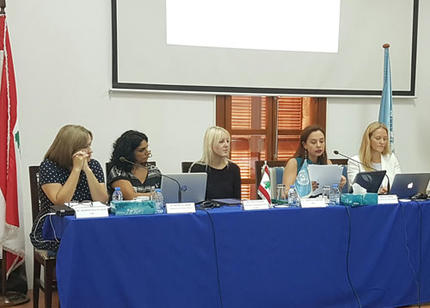Residency systems restrict access to justice for Syrian refugees, study finds
Professionals from Turkey, Jordan and Lebanon gather at LAU to share insights in a two-day conference that concluded the research program.

Experts agreed on the disconnect between government policies and the daily struggles of refugee communities.
A new system of residency introduced for Syrian refugees in 2014 has resulted in half the Syrian population of Lebanon becoming illegal immigrants with limited or no access to the formal justice system. This has further increased their vulnerability.
These are among the conclusions of a two-year research program conducted by LAU’s Institute for Social Justice and Conflict Resolution (ISJCR), together with International Alert (IA) and the UNESCO International Center for Human Sciences (CISH). The study was last week crowned with a conference entitled ‘Access to Justice for Syrian Communities – Formal Challenges, Informal Opportunities.’
No write-up could do justice to the wealth of information shared during the two-day event by about 20 researchers and practitioners, who presented their own relevant experiences, statistics, quotes and insights into the lives and challenges of Syrian communities in Lebanon, Jordan and Turkey.
Tamirace Fakhoury, assistant professor of Political Science at LAU and associate director of the ISJCR, and Karim El Mufti, researcher at CISH, exposed some of the many findings they made over the past two years during which they conducted interviews with Syrian refugees in Lebanon and reviewed hundreds of court cases against Syrians.
Forty percent of prisoners in Lebanon are Syrian, of which 63 percent are on pre-trial detention. Given that over 40 percent of Syrians who go to court are charged with offenses directly related to their vulnerable status, such as possessing forged or nonofficial documents, El Mufti argued that the system is flawed, contradicts international law and highlights the need for a sustainable and sensible approach to the refugee population in Lebanon.
“Lebanon entered panic mode in 2014, closing its borders, issuing 11 obscure categories for visas, deporting vulnerable refugees, halting UNHCR registration, and accusing refugees of social and economic problems,” the researcher explained. “The current policy, as highlighted by our interviews, is to make legal stay as unreachable as possible and make actual stay as uncomfortable as possible.”
As a result of this approach, more than 500,000 Syrian refugees in Lebanon are now considered to be illegal immigrants. This status prevents them from accessing a formal justice system that has already been brought into disrepute by corrupt practices, said Director of the Brehon Institute Shelley Dean on the second day of the conference.
“Informal justice systems are prompt, cost efficient and deliver sound verdicts faster than formal systems,” said Dean, arguing for a greater understanding of such systems by international organizations that are assisting and developing Syrian refugee communities.
Others, including Ph.D. student Ann-Christin Wagner who lives among Syrian refugees in the north Jordanian town of Mafraq, and Şenay Özden of the Hamisch Syrian Cultural House in Istanbul, shed light on the challenges faced by Syrians in Jordan and Turkey, and the options available to them.
“Jordan agreed to issue 50,000 work permits to Syrians and waive the application fee, but they did not understand that most Syrians are not interested in the work permit. Labor is mostly informal in Jordan in any case, and they don’t want to lose access to humanitarian assistance,” said Wagner, highlighting the disconnect between government policies and the daily struggles of refugee communities.
Bringing the conference to a close with a personal and impassioned address was Fadi Hallisso, director of Basmeh & Zeitooneh for Relief and Development. “When we started working in Lebanon we had a dream of working together with Lebanon to establish a historic peace…. But there is a total lack of dialogue between Lebanon and the Syrian community. There is no consultation. We must acknowledge that the residency system in Lebanon is classist and is restricting access to justice for the most vulnerable.”
More
Latest Stories
- A Cardiovascular Conference to Streamline National Expertise
- Aspiring Engineers Compete for Scholarships at LAU
- The School of Engineering Delivers Immersive Learning Experiences
- Consultants in the Making
- LAU Marks Rare Disease Day With a Call for Collaboration
- First Pulsed-Field Ablation in Lebanon Takes Place at the LAU Medical Center
- LAU New York Becomes a Degree-Granting Campus
- Health Science Students Win at the Annual Colorectal Awareness Walkathon

